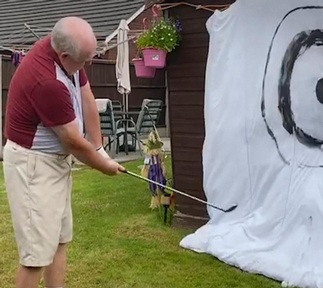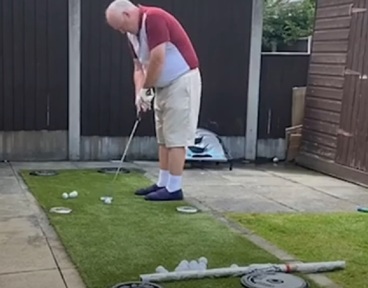Golfer with Alzheimer's created driving range in his garden to keep dementia's black dog away
“I’ve created a homemade [golf] driving range in the back garden out of my wife’s spare duvets” says Tommy Dunne, who was diagnosed with dementia in 2011.

With a passion for golf, Mr Dunne explains: “I’ve added some targets and I use that to practise my chipping”.
Tommy’s home is in Liverpool - one of the cities now facing the toughest restrictions in the country. His home city has been marked as a ‘very high risk’ area when it comes to COVID-19, according to the Government’s new three-tier system for the country.
‘The black dog’
With the impact of the country’s national lockdown earlier this year still fresh in his mind, Tommy's life during the pandemic has been a battle to stay active at home while living with dementia.
“I’ve had to be creative and adapt to keep moving during the coronavirus pandemic and in lockdown as I wasn’t able to get out as much unfortunately.”

Diagnosed with early onset Alzheimer’s in 2011, he says: “I found that with dementia it’s not memory loss that is the only symptom. My mood and spatial awareness are sometimes affected, to the point where it can be tempting to sit with my dementia and do nothing at all.
“There are days when we call it the black dog, when dementia comes and sits beside you and it doesn’t want you to do anything.
"But you’ve got to get up and get active, even when you don’t want to. I’ve found that exercise is a great way of passing the time, helping relieve stress, helping relieve anxieties. I’ve figured out so many ways to keep moving and stay on my toes.
“Whether I’m doing a bit of karaoke in the living room or a spontaneous workout in the garden, it all really does help me!
“I like anything that keeps me outdoors or up on my feet and having a bit of fun! You’ve got to make it fun when doing exercise around the house."
‘It went blank'
Five years after his diagnosis, Tommy told homecare.co.uk about the day Alzheimer’s first revealed itself to him. Having worked his way up the corporate ladder from train driver to rail compliance manager, he was in a business meeting with his company directors and says: “It was like a numbness coming over me.
“Like when a film comes off a reel…when it just runs out. I could hear a noise, it sounded like a compressor slowing down. That’s the last thing I remember. Everything was flickering and then it went blank.”
The next thing Tommy remembers, he is in bed and his wife Joyce is standing over him. “I was sweating and shaking. My wife found me in bed shaking, so she asked my boss 'what have you done to Tommy?' "
Tommy’s wife Joyce helps him put on his clothes to stop him wearing a jumper the wrong way round or walking around in two different types of shoes. She gets his bath ready and makes sure he gets in and out of it safely. She prepares meals and watches him take his medication, in case he drinks the glass of water but forgets to put the pills in his mouth.
“If Joyce didn’t tell me to take my medication I wouldn’t take it. I wouldn’t eat because I no longer feel hungry. I need to be reminded to drink. I usually take a sip to stop my tongue sticking to the top of my mouth. I wouldn’t go out. She tells me where I’m going and comes with me. She tells me 'You know, I’m bloody proud of you'. But who’s there to tell her?
“A person with dementia uses twice the energy to have a conversation… it’s like we’re running a marathon."
Tommy was first told he had dementia in 2011. He told homecare.co.uk in 2016: “I felt a cold sweat running down my back. My life was over. I was going to be put in a home, in a chair. Left to watch other people.”
'Can't' doesn't exist
Today, he sees his life a lot differently.
Married to Joyce since 1970, Tommy is a grandfather. He is also an Everton supporter who loves “the odd pint with my mates”. Before the pandemic, he had travelled the UK and abroad to share his experiences of living with the ‘black dog’ in speeches to the public.
He flew out to Budapest to speak at the 31st International Conference of Alzheimer’s Disease. He has this to say about dementia: “While there is no cure for Alzheimer’s, there is a cure for people’s uninformed, if well-meaning, responses to Alzheimer’s.”
He has become a poster boy for the charity the Alzheimer’s Society and its #weareundefeatable campaign. To support the campaign he has recorded a video of his exercises in lockdown.
The COVID-19 pandemic and lockdown has brought its own challenges and he admits: "There’s nothing better than a feel-good feeling of being able to get out and about."
Living life in lockdown with dementia, he says “Exercise is such a great way of passing the time and helps to relieve stress and anxieties. It releases all the endorphins and gives you the feel-good factor.
“For me, the word ‘can’t’ doesn’t exist. I hear it so many times, but I can do it, it keeps me going and even a smile or a dance can help.”
Latest News
 29-Jul-24
Dementia Bus gives carehome.co.uk staff insight into life with dementia
29-Jul-24
Dementia Bus gives carehome.co.uk staff insight into life with dementia
 27-Jul-23
UK's top home care agencies in 2023 revealed
27-Jul-23
UK's top home care agencies in 2023 revealed
 30-Nov-22
A quarter of older people keep their falls secret from family
30-Nov-22
A quarter of older people keep their falls secret from family
 29-Nov-22
'Covid-19 has not gone away' say terminally ill
29-Nov-22
'Covid-19 has not gone away' say terminally ill
 28-Nov-22
IT consultant who received poor care opens 'compassionate' home care business
28-Nov-22
IT consultant who received poor care opens 'compassionate' home care business